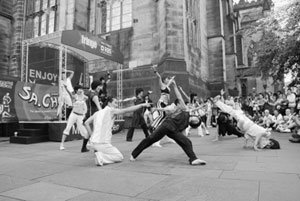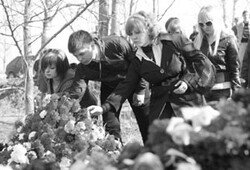- 3200여 명이 공부하고 있는 ‘실용영어 사관학교’ 영국문화원이 이번호부터 신동아 독자에게 영어 실력을 쌓을 수 있는 비법을 공개한다.
- 런던정경대 등 영국의 명문대 출신 전문 강사 50여 명이 영어로 읽고 쓰고 말하는 능력을 기를 수 있는 훌륭한 교재를 제공할 계획이다.
- 영어실력 향상에 큰 도움이 되길 바란다.‘편집자’

2008년 8월 영국 에든버러 프린지 페스티벌에 참가한 한국의 비보이댄스팀.
>>> Pre-reading Task: Reading for Prediction 추론하며 읽기
It is common for people in their own language to use the sub-skill of reading for prediction to gauge the personal interest value of a text through headlines, sub-headings, photographs and illustrations, and so on. However, when it comes to reading in a foreign language, people often forget to do this, often thinking instead something like ‘if I read this, it′ll be good practice’. Predicting, though, motivates us to read, and therefore is an important sub-skill to practice.
(모국어를 쓰는 사람들은 글이 자신의 관심사와 잘 맞는지 확인해 보기 위해 당연히 글의 제목, 소제목, 사진, 삽화 등을 통해 추론하면서 읽는 방법을 사용합니다. 그러나 외국어를 읽을 때는 이 방법을 잊어버리고 “이 글을 읽으면 좋은 연습이 될 거야” 라고만 생각합니다. 하지만 추론하기는 읽는 이가 글에 흥미를 느낄 수 있게 합니다. 따라서 영어실력을 쌓기 위해서도 이 방법을 연습하는 것이 아주 중요합니다.)
Looking at the headline and layout below, think about these questions:(아래 기사의 제목과 구성을 살펴보고 다음의 질문들을 생각해보시오.)
1. What′s the Edinburgh Festival? What time of year does it take place?
2. ‘Traditional’ and ‘contemporary’: but what? What would you expect to see at the Edinburgh Festival?
3. Looking at the photo, what kind of job do you think he does? Why do you think he′s such a ‘Busy man’?
(1. 에든버러 페스티벌은 어떤 행사입니까? 1년 중 언제 이 페스티벌이 열릴까요?
2. 무엇이 전통적이고 또 무엇이 현대적이라는 걸까요? 에든버러 페스티벌에서 어떤 것을 볼 수 있을 거라고 생각하세요?
3. 아래 사진을 보면 그가 어떤 직업을 가지고 있다고 생각하세요? 왜 그는 ‘바쁜 사람’일까요?)
>>> Reading for Vocabulary Development: Matching Exercise 어휘 향상시키기: 빈칸 채워 넣기
A good way to improve your lexical range is by using texts like this to guess the meaning of unknown words in context. See if you can guess the meanings of some of the words in the article, and then test your knowledge by putting the words from the box in the text below. You may need to change the form of the word to do so:
(여러분의 어휘 실력을 향상시킬 수 있는 좋은 방법 중 하나는 모르는 단어들이 문맥에서 어떠한 의미를 갖는지 추측해볼 수 있도록 위와 같은 글을 읽어 보는 것입니다. 위의 기사에 등장한 단어들의 의미를 파악할 수 있는지 확인해 보고, 아래 글의 빈칸에 알맞은 단어를 박스에서 찾아 넣어보기 바랍니다.)
|

영국 에든버러 시가지.
(저에게는 네 명의 아이가 있는데, 아이들이 저마다 그렇게 다를 수가 없어요. 제 딸은 중요한 작품을 쓴 작가로 성공했지만, 아들들은 딸의 학문적인 성취를 결코 시도해 본 적이 없어요. 학교에서 아들들은 평범한 수준의 성적만을 받았고, 분명 사고하는 능력보다는 신체적인 활동 능력에 더 알맞은 아이들이었죠. 사실 제 아들들은 집에서 공연하는 원숭이처럼 뛰어 다니곤 했고, 확실히 농담을 하기보다는 슬랩스틱 코미디 같은 몸으로 하는 유머를 더 좋아했습니다. 아무리 그 왕성한 에너지를 직업을 위한 공부에 쏟게 해보거나 뭔가 좀 더 생산적인 방향으로 바꿔보려 해도, 아이들은 항상 사고만 저지르는 것처럼 보였죠. 저는 항상 여자아이들이 남자아이들보다 더 열심히 공부하고, 아들들은 언제나 큰 실망감만을 안겨준다고 생각해요.)
>>> Pre-reading Task 답
Of course, this is a prediction exercise, so your motivation to read might depend on the answers you were able to give to these questions:
(물론 이것은 추론 연습이고, 따라서 여러분의 읽고자 하는 동기는 여러분이 위의 질문에 대답할 수 있었는지에 달려 있습니다.)
1. There′s actually a whole range of festivals in Edinburgh throughout the summer (including the International Film Festival, International Book Festival, Science Festival, Jazz and Blues Festival, the Edinburgh Military Tattoo, and so on), many of which coincide in August each year. However, the official Edinburgh International Festival is a high-culture event, featuring opera, classical concerts, ballet, etc. by internationally famous artists, while the Fringe features popular music, drama, and comedy by unknowns as well as the famous. For more information, see the website www.edinburghfestivals.co.uk.
(국제영화제, 국제도서축제, 과학축제, 재즈&블루스 축제, 에든버러 군악대 축제 등 여름 동안에 에든버러에서는 다양한 축제가 열리고, 이 중 많은 축제가 매년 8월에 열립니다. 공식 에든버러 국제 페스티벌은 오페라, 클래식 콘서트, 발레 등의 분야에서 국제적으로 유명한 예술가들이 공연을 펼치는 고급 문화 행사인 반면, 프린지 페스티벌의 경우 유명 예술인뿐만 아니라 무명의 예술인들 또한 대중음악, 연극, 코미디 등의 공연을 보여주는 행사입니다. 추가적인 정보가 필요한 경우 홈페이지(www.edinburghfestivaals.co.uk)를 방문해서 확인하십시오.)
2. Both the Edinburgh International Festival and the Fringe feature performers from all over the world: there is virtually no limit to the kind of performance on show, especially in the Fringe. However, getting a venue as a performer or troupe can be difficult, and it is necessary to apply to the organisers months in advance (not everyone is accepted, as the organisers try to keep standards as high as possible). But the city in August sees every possible style of performance from grand opera in traditional style to new interpretations of old favourites to completely new works and street improvisation.
(에든버러 국제 페스티벌과 프린지 페스티벌, 이 두 축제에서 관객은 전세계에서 온 예술가들을 만나볼 수 있습니다. 특히 프린지 페스티벌에서는 실상 공연의 종류에 있어 제한이 없지만, 개개인의 예술가 또는 공연단이 공연장을 구하는 것은 어려울 수 있으므로 가능한 한 빨리 주최 측에 지원할 필요가 있습니다. 주최 측에서는 페스티벌의 수준을 최대한 높이려고 하기 때문에 신청한다고 해서 모두 받아들여지는 것은 아닙니다. 8월 에든버러시에서는 전통적인 스타일의 대규모 오페라에서부터 이전 유명 작품들을 새롭게 해석한 작품들, 그리고 완전히 새로운 예술 작품 및 거리 즉흥 공연까지 즐길 수 있습니다.)
3. You don′t have to read far into the article to find out that Jon Morgan was recently director of the Fringe. Nevertheless, by glancing at his photo you would probably have gathered that he′s not a performer, and therefore predicted that he is likely to be involved in arts administration. Hearing that his nickname is ‘Busy man’ would no doubt further this assumption, as we might expect the man behind the biggest arts festival in the world to have a lot of work to do.
(Jon Morgan이 최근 프린지 페스티벌의 총감독이었다는 것을 확인하기 위해서 위의 기사 전체를 읽을 필요는 없습니다. 그의 사진을 보고 아마도 그가 공연가는 아니라는 것을 짐작했을 것이고, 따라서 그가 행정적인 업무와 관련이 있는 사람이라는 것을 추론할 수 있었을 겁니다. ‘Busy Man’이라는 수식어는 이러한 가정이 맞다는 것을 보여주는데, 국제적으로 가장 큰 예술 페스티벌을 진행하기 위해서는 해야 할 일이 많다는 것을 짐작할 수 있기 때문이죠.)
|
>>> Notes and Explanations 부연 설명
ⓐ ‘On the fringe/s’ is an English expression which denotes something on the borders of the mainstream, and hence we get the expression ‘fringe festival’. People often talk casually about ‘the Edinburgh Fringe Festival’, but here the authors have chosen to highlight an inconsistency: that, in fact, the Fringe is an adjunct to the official Edinburgh International Festival, and developed from a series of side-events to the first EIF in 1947. Although the Fringe is now much bigger than the official festival, ‘Edinburgh Fringe Festival’ is, therefore, actually a misnomer.
(‘On the fringe or fringes’ 는 주류가 아닌 그 경계에 있는 것들을 일컫는 영어 표현으로, ‘fringe festival’이라는 명칭도 이 표현으로부터 유래합니다. ‘fringe festival’은 대개 ‘Edinburgh Fringe Festival’이라고 하는데, 위의 기사에서는 이 명칭이 잘못 통용되고 있다는 것을 강조하기 위해 ‘the Fringe’라는 단어를 선택했습니다. 다시 말해, 프린지 페스티벌은 에든버러 국제 페스티벌의 일부로 1947년 제1회 에든버러 국제 페스티벌의 부속 이벤트 중 하나로 만들어졌습니다. 현재는 프린지 페스티벌이 공식 페스티벌보다 훨씬 더 성장하기는 했지만, ‘에든버러 프린지 페스티벌’은 정확히 말하자면 잘못된 이름입니다.)
ⓑ The TAG Theatre Company is Scotland′s oldest touring theatre company, dating from 1967. Its target audience is young people, and they run drama workshops for children, as well as touring around the world and working on international projects.
(TAG Theatre Company는 스코틀랜드의 가장 오래된 순회공연 극단으로 1967년에 만들어졌습니다. 이 극단의 주요 타깃은 젊은 층이고, 세계를 돌아다니며 순회공연을 열고 국제적인 작업들에 참여하는 것뿐 아니라 아이들을 위한 연극 워크숍을 주최하기도 합니다.)
ⓒ Korea@Fringe Showcase was a 2007 collection of Korean dance and drama performances at the Fringe. Officially known as the ‘2007 Edinburgh Fringe Participants Support Programme’, Korea@Fringe was a joint venture of the Ministry of Culture and Tourism and the Seoul Metropolitan Government, with the aim of raising the international profile of Korean arts.
(Korea@Fringe Showcase는 2007년 프린지 페스티벌에서 한국 댄스 공연과 드라마 공연을 한자리에서 소개했던 행사입니다. Korea@Fringe의 공식 명칭은 ‘2007 에든버러 프린지 참가자 후원 프로그램’으로 한국 문화예술을 세계적으로 알리기 위해 마련된 한국 문화관광부와 서울시의 합작품입니다.)
ⓓ Bu‥chner′s naturalistic play was unfinished at the time of his death in 1837. It concerns the life of the eponymous soldier, who after suffering poverty and humiliation stabs his mistress to death: it was roughly based on a real-life case from Leipzig, of a murderous soldier called Woyzeck who was beheaded for his crime in 1824. Sadari Movement Laboratory′s interpretation was part of the Korea@Fringe Showcase.
(뷔히너의 사실주의 연극으로 1837년 그가 죽을 당시에는 미완성의 상태였습니다. 가난과 모멸을 겪은 뒤 애인을 난도질해 죽음으로 몰고 갔던 한 병사의 이야기를 다룬 이 연극은, 1824년 독일 라히프치히에서 사형당한 보이첵이라는 한 병사의 실제 삶과 그가 저지른 범죄를 소재로 한 것입니다. 사다리움직임연구소가 뷔히너의 미완성 작품을 재해석한 연극인 ‘보이첵’은 Korea@Fringe Showcase의 일부로 공연됐습니다.)
























![[지상중계] 제12회 나지포럼, “북미 정상회담 성과내기 어려워”](https://dimg.donga.com/a/380/211/95/1/ugc/CDB/SHINDONGA/Article/69/43/48/32/69434832107aa0a0a0a.jpg)
